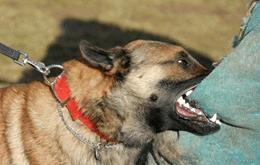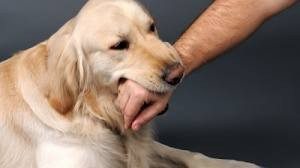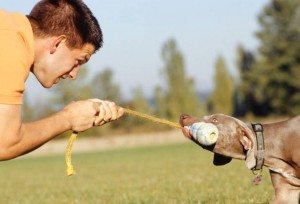Hello,
I have a ten month old Bernedoodle (half Bernese half poodle). He is still in his puppy stage and his biting has gotten better except for when we have him on his long leash on the back yard. Whenever he barks at the door we put him on the leash in the backyard for his to do his business. We have many bushes in our backyard and he often gets tangled up. When we go to untangle him he starts to bite. He thinks he’s playing but it’s fairly painful. He goes for our hands and anything he can bite and jump to. We are not sure how to stop this. There are times when I am out there with him and we start playing fetch but he looses interest and starts to bite.
Any tips are greatly appreciated.
Thanks
Taylor
Hello Taylor,
It seems like you’ve got your hands full with a feisty teenager there! I do like that your pup has learned how to ask to go outside though, that is great news. I do have to ask though, do you tie him out because you don’t have a fully fenced backyard? Most dogs prefer being outside with their person as opposed to be alone. Being alone can get quite boring for our dogs, even though they seem to enjoy their time outside.
The biting you are mentioning seems to be frustration on the part of your pup. Both when you go to untangle him, and when you go to play with him outside. Does he always use a hard mouth when playing with you? Or is this only when he is outside? I can’t help but wonder about his bite inhibition though…how hard he’s learned to control his mouth. Dogs learn how to control the strength of their bite before they are five months of age, and most dogs learn to use a soft mouth quite early on.
To help him learn how to have a softer mouth, you can offer him a treat in a closed fist. As soon as he’s not mauling at your hand for it, and becomes patient, then you can mark the wanted behavior with a Good or a Yes and then open your hand, palm up, so he can take the treat from your palm. You will need to practice this over a few weeks until your dog learns that he’ll only get the treat once he is calm and using a soft mouth.

When your dog does mouth you, be mindful of your hands. Avoid jerky movements and yanking your hands or feet away from his mouth. This may just excite him more, and encourage him to use his mouth harder. Instead, try turning from him, crossing your arms over, or just leave them hanging limp.
I would also avoid using punishment to stop the behavior. This includes yelling at the dog, squeezing it’s muzzle, hitting the dog, or shoving fingers down into their throats.Often times this just increases the arousal level in the dog and can actually entice further aggression.
What you can do to help him stop mouthing too hard is to stop reinforcing the behavior. It’s normal for dogs to play with their mouths. When you see dogs playing together, you’ll see that they bite each other a lot. And they actually enjoy it, so long as the biting doesn’t get too hard. If it does, then the bitten dog may yelp, and will often just stop playing. This teaches the biting dog that hard bites mean end of play time.
You can do the same thing. I don’t suggest yelping like a puppy though, as this can sometimes just make a dog more excited. But what does work is a time out of sorts. This doesn’t mean putting your dog into a time out corner, but rather, just removing yourself from the situation. When your dog uses his mouth too hard, simply move away from your dog and end the play session. You only need to wait about 10 seconds, and then you can resume playing. If the dog uses his mouth too hard again, then you’ll need to remove yourself again. If he continues with a hard mouth, then you should remove yourself not only from the play, but from the room. But never for more than 10 – 20 seconds. Every time you return, you should encourage your dog to play again. The goal here is to teach your dog that gentle mouth play gets more play time, while hard mouth play makes the playing stop. Pretty soon your dog will learn that to keep playing with you, he’ll need to control his mouth.
I would suggest, if at all possible, to also take your dog out for walks, instead of just letting him go out in the backyard. Letting him out just to do his business is fine, but dogs require daily exercise, and being tied out simply doesn’t provide enough physical and mental stimulation, especially for a teenager. So I would suggest at least two walks a day. Walks of at least 20 to 30 minutes each. Daily walks, even short ones of only 10 minutes per day are much better than no walks during the week, and only one or two big walks on the weekend.
There are also some great games you can play in the house to increase his exercise as well. Hide and Seek is a game that most dogs adore. You can also teach your dog how to use a treadmill if you have one, but this should only be done while the dog is supervised. Then there is mental stimulation as well. Food dispensing toys, intelligence toys and food puzzles all offer your dog much needed mental stimulation.
Another great game to play with your dog is Tug of War. Use a long rope or tug toy to safely bridge the distance between your hands and the dog’s mouth. Most dogs love a good game of tug, but the game should have strict rules. If the dog doesn’t let go when asked, or uses his mouth on your hands, then the game stops. No need to say No, just drop the toy and stop playing. The great thing about this is that your dog needs you to play with game with him. He can’t play tug alone. I love Tug of War because it helps with high arousal and low levels of frustration. Another great thing is that the dog has an acceptable outlet where he can use his mouth as hard as he wants, so long as it’s on the toy. The game can also become a great alternative when you notice that your dog is becoming excited or aroused, and you can now offer your dog a good game of tug to deal with his excitement.
Another important issue to address is impulse control. Some dogs use their mouth on their people when they get over excited. It’s important that dogs learn how to temper themselves. You can start by teaching your dog a couple commands such as Sit, Down, Stay and Leave It. When you notice your dog becoming too excited, you can ask him for one his known commands. Once he knows his commands well, and has been rewarded for good these good behaviors, he’ll soon be offering these behaviors instead of the unwanted ones.
Having a teen aged dog can be trying for sure, but if you take the time to meet his physical and mental needs, then things should go a lot smoother.
Good luck and happy training!
Meira
 Montreal Dog Blog Montreal's Online Dog Park
Montreal Dog Blog Montreal's Online Dog Park






